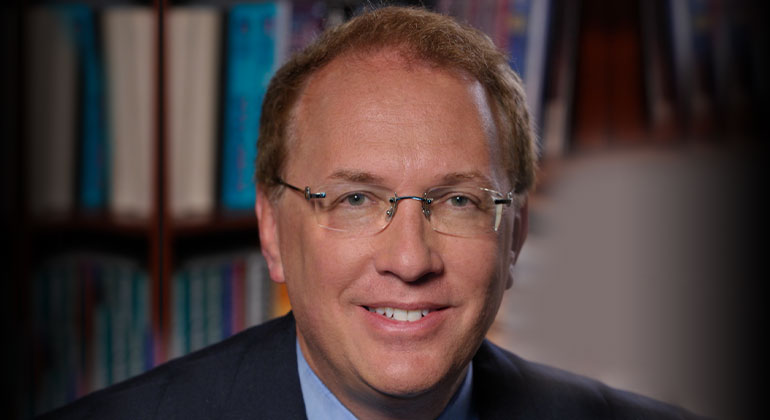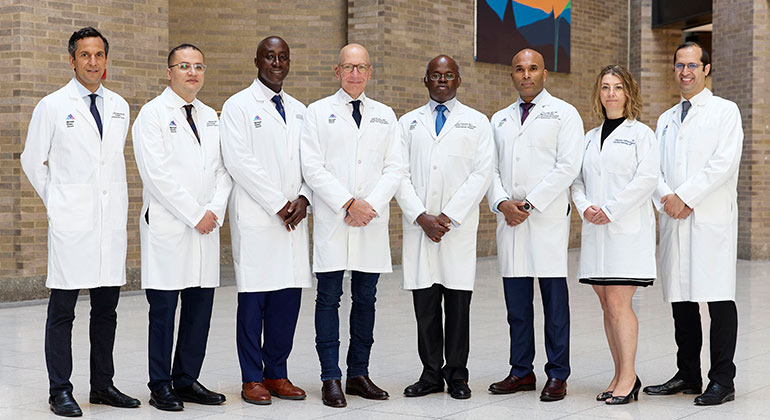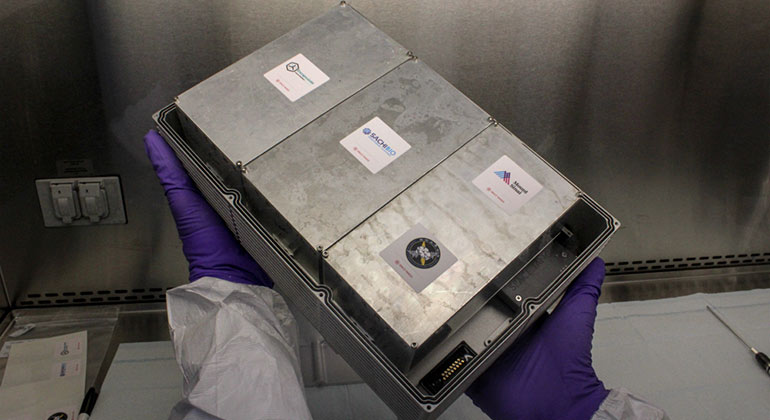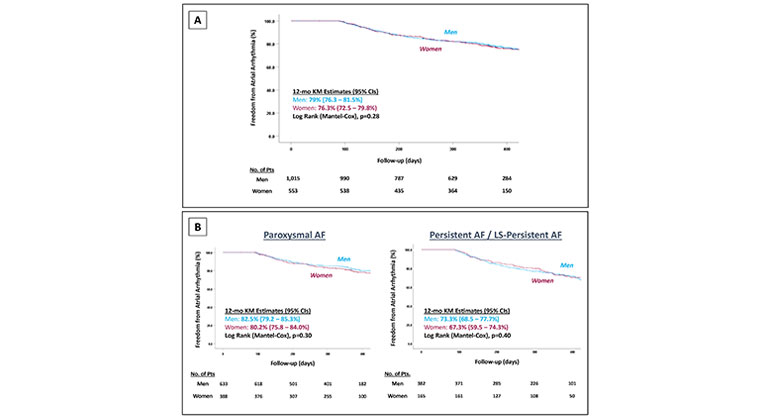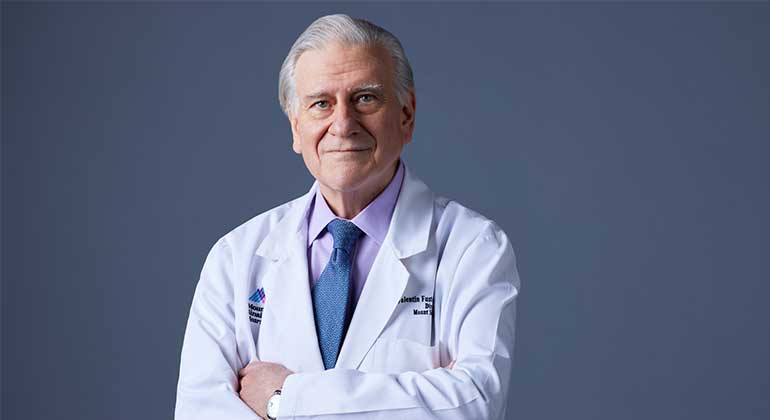Making Waves with Robotic Ultrasound Between New York and Chicago
Icahn School of Medicine at Mount Sinai and Rush University Medical Center are testing in a new clinical trial long-distance, tele-robotic ultrasound over the Internet.
A new clinical trial is testing the feasibility and efficiency of a doctor in New York City remotely performing long-distance, tele-robotic ultrasound exams over the Internet on patients in Chicago.
The pioneering study is a research collaboration between cardiovascular imaging specialists of Icahn School of Medicine at Mount Sinai in New York and Rush University Medical Center in Chicago.
The research team is investigating if remote, long-distance tele-robotic ultrasound exams of the carotid artery in the neck could be just as efficient as traditional, in-person manual ultrasound exams to test for signs of carotid intima-media thickness and carotid atherosclerotic plaque which are risk factors for cardiovascular events, such as heart attack and stroke.
The study, enrolling 100 study participants over the age of 60 in Chicago at Rush, is using a small, robotic arm outfitted with ultrasound technology and connected to a personal computer with a standard Internet connection. The robot is controlled over the Internet by a Mount Sinai New York cardiovascular specialist with the ability to complete a scan of the carotid artery in just four minutes. In addition, each patient will also receive a manual, in-person ultrasound exam by Rush to compare detection results.
"Launching long-distance, tele-robotic ultrasound exams between two major hospitals in two large cities is a sign that we may be able to make waves in accelerating access to and cost-effectiveness of this critical heart health imaging diagnostic tool to other cities, small towns, or rural communities in need," says Partho P. Sengupta, MD, the study's principal investigator at Mount Sinai and Director of Interventional Echocardiography and Cardiac Ultrasound Research, and Associate Professor of Medicine (Cardiology) at Icahn School of Medicine at Mount Sinai.
"Imaging technology is evolving at a rapid pace. If this tele-health breakthrough proves feasible and successful it may open the door for more accessible screening, prevention, and diagnostic capabilities for patients who may be at high-risk for cardiovascular diseases," says Rami Doukky, MD, MSc the study's principal investigator at Rush, Professor of Medicine and Radiology at Rush Medical College and the Interim Chief of Cardiology at the John H. Stroger, Jr. Hospital of Cook County in Chicago.
"Our platform brings together remotely controllable robotics, ultrasound, and telepresence to allow an experienced operator located anywhere in the world to perform an ultrasound exam at a distance," says Jeffrey Soble, MD, Associate Professor of Cardiology at Rush University Medical Center, who is one of the creators of the novel tele-robotic healthcare technology being tested called TRUDI (Tele-Robotic Ultrasound for Distance Imaging), a product of the company TeleHealthRobotics which he co-founded with biomedical engineer Sarah Doherty.
This new pioneering clinical trial in the United States, builds upon the recent research breakthrough collaboration of Mount Sinai and TeleHealthRobotics' technology using remote, long-distance robotic-assisted ultrasound imaging internationally.
While in Germany, Mount Sinai's Dr. Sengupta, used TRUDI to perform the first robot-assisted trans-Atlantic ultrasound examination on a person in Boston. "Our successful first-in-man international experiment opened up a new frontier for the use of remote, robotic ultrasound imaging that could potentially be more efficient and cost-effective overall for healthcare delivery," says Dr. Sengupta.
In addition, Mount Sinai and collaborators in Sweden tested the feasibility of similar tele-robotic ultrasound technology within Sweden for heart failure patients at a remote primary care center located a far distance from the nearest Swedish hospital. "Our tele-robotic ultrasound approach reduced the time to care and improved patient satisfaction substantially," says Jagat Narula, MD, PhD, that study's senior investigator and Mount Sinai's Director of Cardiovascular Imaging.
"Our recent research breakthroughs give us a glimpse of what to expect in the near future, a patient-friendly imaging technology at your doorstep," added Dr. Narula.
Valentin Fuster, MD, PhD, Director of Mount Sinai Heart at Mount Sinai says: "Tele-robotic imaging may be the key'helping hand' we need to accelerate greater local and global healthcare access."
About the Mount Sinai Health System
Mount Sinai Health System is one of the largest academic medical systems in the New York metro area, with more than 43,000 employees working across eight hospitals, over 400 outpatient practices, nearly 300 labs, a school of nursing, and a leading school of medicine and graduate education. Mount Sinai advances health for all people, everywhere, by taking on the most complex health care challenges of our time — discovering and applying new scientific learning and knowledge; developing safer, more effective treatments; educating the next generation of medical leaders and innovators; and supporting local communities by delivering high-quality care to all who need it.
Through the integration of its hospitals, labs, and schools, Mount Sinai offers comprehensive health care solutions from birth through geriatrics, leveraging innovative approaches such as artificial intelligence and informatics while keeping patients’ medical and emotional needs at the center of all treatment. The Health System includes approximately 7,300 primary and specialty care physicians; 13 joint-venture outpatient surgery centers throughout the five boroughs of New York City, Westchester, Long Island, and Florida; and more than 30 affiliated community health centers. We are consistently ranked by U.S. News & World Report's Best Hospitals, receiving high "Honor Roll" status, and are highly ranked: No. 1 in Geriatrics and top 20 in Cardiology/Heart Surgery, Diabetes/Endocrinology, Gastroenterology/GI Surgery, Neurology/Neurosurgery, Orthopedics, Pulmonology/Lung Surgery, Rehabilitation, and Urology. New York Eye and Ear Infirmary of Mount Sinai is ranked No. 12 in Ophthalmology. U.S. News & World Report’s “Best Children’s Hospitals” ranks Mount Sinai Kravis Children's Hospital among the country’s best in several pediatric specialties.
For more information, visit https://www.mountsinai.org or find Mount Sinai on Facebook, Twitter and YouTube.

Inter-Atrial Shunts May Benefit Some Heart Failure Patients While Harming Others
Apr 06, 2024 View All Press Releases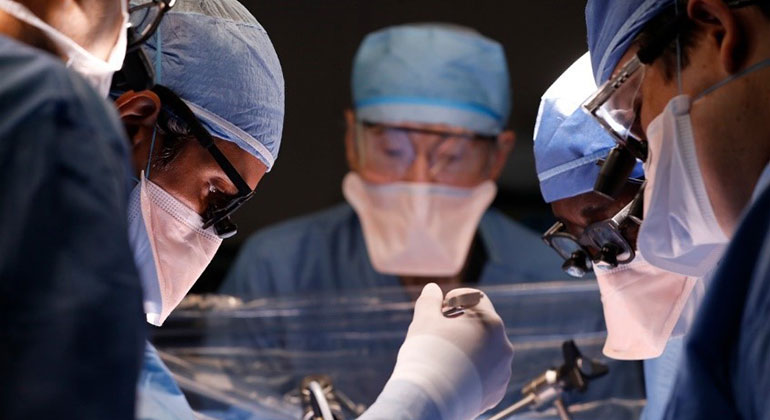
Ismail El-Hamamsy, MD, PhD, Named President of the Heart Valve Society
Feb 22, 2024 View All Press Releases
